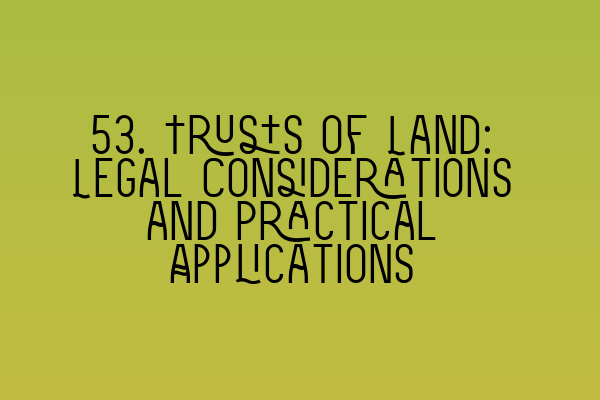Trusts of Land: Legal Considerations and Practical Applications
Welcome to SQE Property Law & Land Law, where our team of expert solicitors specialize in providing legal advice and solutions for a wide range of property matters. In this blog post, we will be delving into the topic of trusts of land and exploring the legal considerations and practical applications surrounding them.
What is a Trust of Land?
A trust of land is a legal arrangement in which one person (the trustee) holds and manages property on behalf of another person (the beneficiary). The trustee has a legal obligation to act in the best interests of the beneficiary and must manage the property in accordance with the terms and conditions set out in the trust deed.
Trusts of land are commonly used for various purposes, such as estate planning, asset protection, and facilitating joint ownership of property. They can be created during a person’s lifetime or be established upon their death through a will.
Legal Considerations in Trusts of Land
When setting up a trust of land, it is crucial to consider the following legal aspects:
Trust Deed
The trust deed is a legally binding document that outlines the terms and conditions of the trust. It must clearly state the names of the trustee and beneficiary, the purpose of the trust, and the rights and responsibilities of each party. The trust deed should be drafted by a qualified solicitor to ensure its legality and efficacy.
Beneficiary Rights
The rights of the beneficiary in a trust of land are of utmost importance. They include the right to receive income generated from the property, the right to reside in the property, and the right to sell or transfer their interest in the property. It is essential to clearly define these rights in the trust deed to avoid any potential disputes or misunderstandings.
Trustee Duties
Trustees have a fiduciary duty to act in the best interests of the beneficiary. This includes managing the property diligently, keeping accurate records, and providing regular updates to the beneficiary regarding the property’s status. Trustees must also act impartially and avoid conflicts of interest.
Legal Formalities
Trusts of land must comply with certain legal formalities to be valid. These include creating a written trust deed, transferring legal title to the trustee, and ensuring any required registrations or notifications are completed. Failure to fulfill these formalities can render the trust void or open to legal challenges.
Practical Applications of Trusts of Land
Trusts of land have numerous practical applications that can benefit individuals and families. Some common scenarios in which trusts of land are utilized include:
Estate Planning
Trusts of land can be an effective tool in estate planning. By transferring property into a trust, individuals can ensure that their assets are distributed according to their wishes after their death, while potentially minimizing inheritance tax liabilities. Trusts can also provide ongoing management for properties if beneficiaries are unable or unwilling to manage them directly.
Joint Ownership
Trusts of land are commonly used in situations where multiple individuals wish to own a property together. Through a trust, each co-owner can have their interest protected and enforceable, ensuring that their rights are respected. Trusts can also help facilitate the smooth transfer of property ownership in the event of a co-owner’s death or the desire to sell.
Asset Protection
Trusts of land can provide a level of asset protection by separating legal ownership from beneficial ownership. By placing property into a trust, individuals can shield their assets from potential creditors or legal claims. However, it is essential to seek professional advice to ensure that the trust structure is set up in a legally sound and tax-efficient manner.
Conclusion
Trusts of land are a versatile and powerful legal tool that can have significant benefits for individuals and families. To ensure that trusts are established and managed properly, it is crucial to seek advice from experienced solicitors who specialize in property law.
At SQE Property Law & Land Law, we have a team of expert solicitors ready to assist you with all your property and trust-related needs. Whether you require advice on setting up a trust of land, resolving disputes, or navigating the complexities of property law, we are here to help.
For more information on legal exams and preparation, you may find these related articles useful:
- SQE 1 Practice Exam Questions
- SQE 1 Practice Mocks FLK1 FLK2
- SQE 2 Preparation Courses
- SQE 1 Preparation Courses
- SRA SQE Exam Dates
Contact SQE Property Law & Land Law today to schedule a consultation and discover how we can assist you with your property matters.
